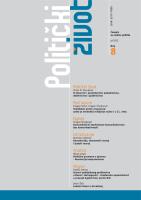Komunikativni kapitalizam – komunikacija bez komunikativnosti
Communicative Capitalism – Communication Without Communicability
Author(s): Dragan ŠtavljaninSubject(s): Media studies, Political Sciences, Government/Political systems, Politics and communication
Published by: Fakultet političkih nauka Univerziteta u Beogradu
Keywords: Communicative capitalism; audience democracy; mediated politics; hype; the commodification of politics; party democracy; postpolitics; the re-presentation of representation; the Pangloss scenario;
Summary/Abstract: Due to the increasing importance of information and media, modern democracy is more often referred to as a „media democracy“, an „audience democracy“, or a „communicative capitalism“ – which marks a shift from „party“ democracy. The goal is to make politics fun-filled. It is a simultaneous process of the politicization of the political periphery and depoliticization of foundations of politics, which leads to the creation of a new model of political communication, or the „postpolitics“. The „new politics“ refocusses the engagement outside the parliamentary system. It is characterized by personalized rather than collective engagement and a stronger emphasis on single issues rather than on overarching ideologies. Politicians previously represented the public. They now mostly represent themselves. This leads to a „democracy without citizens“. It means that one of the reasons for the crisis of political legitimacy is the preponderance of the media policy as it makes the relationship between the representatives and the represented even more mediated, i.e. distant. Thus, power is shifted away from parliament and concentrated in the hands of specialized agencies that are unelected and unrepresentative, which, as much as multinational corporations, have „power without responsibility“.
Journal: Politički život
- Issue Year: 2013
- Issue No: 8
- Page Range: 27-40
- Page Count: 14
- Language: Serbian

